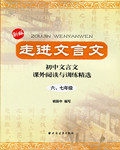
 走进文言文系列答案
走进文言文系列答案科目:初中英语 来源:2012届安徽省芜湖市毕业学业中考模拟三英语试卷(带解析) 题型:完型填空
My mother often asked me, “what is the most important part of the body?” Through the years I would guess at 1 I thought was the correct answer. When I was younger, I thought sound was very important to us as humans, so I said, “My 2 , Mommy.” She said, “No. Many people are deaf. But you 3 thinking about it and I will ask you again soon.”
Then last year, my Grandpa 4 . Everybody was hurt. Everybody was crying. My Mom looked at me when it was our 5 to say our final goodbye to grandpa. She asked me, “Do you know the most important body part yet, my dear?” I was shocked 6 she asked me this now. I always thought this was a game between her and me. She saw the confusion(迷惑) on my face and told me, “This 7 is very important. It shows that you have 8 lived your life”. I saw her eyes well up with tears. She said, “My dear, the most important body part is your shoulder.” I asked, “Is it because it holds up your head?”
She replied, “No, it is because it can hold the head of a friend or loved one when they 9 . Everybody needs a shoulder to cry on sometime in life, my dear. I only hope that you have enough love and 10 that you will have a shoulder to cry on when you need it.”
| 【小题1】 |
|
| 【小题2】 |
|
| 【小题3】 |
|
| 【小题4】 |
|
| 【小题5】 |
|
| 【小题6】 |
|
| 【小题7】 |
|
| 【小题8】 |
|
| 【小题9】 |
|
| 【小题10】 |
|
查看答案和解析>>
科目:初中英语 来源:2013-2014学年浙江省瑞安市九年级元月调考模拟考试英语试卷(解析版) 题型:单项填空
The headmaster turned a deaf ear to the _____ of the parents.
A. words B. sounds C. voice D. noise
查看答案和解析>>
科目:初中英语 来源:2014届江苏高邮八年级下期期末考试英语卷(解析版) 题型:阅读理解
For many years, no one could communicate with people who had been born without hearing. These deaf people were not able to use a spoken language.
But, beginning in the 1700s, the deaf were taught a special language. Using the language, they could share thoughts and ideas with others. The language they used was a language without sound. It was a sign language.
How did this sign language work? The deaf were taught to make certain movements using their hands, faces, and bodies. These movements stood for things and ideas. People might move their forefingers across their lips. This meant, “You are not telling the truth.” They might tap their chins with three fingers. This meant, “my uncle”.
The deaf were also taught to use a finger alphabet(字母表). They used their fingers to make the letters of the alphabet. In this way, they spelled out words. Some deaf people could spell out words at a speed of 130 words per minute.
Sign language and finger spelling are not used as much as they once were. Today the deaf are taught to understand others by watching their lips. They are taught how to speak.
1.In the 1700s, the deaf were taught __________.
A. to speak B. to watch others
C. a sign language D. a spoken language
2.The word forefingers in paragraph 3 means__________.
A. the finger next to the thumb (拇指) B. three fingers
C. a language D. hands
3.On the whole the story is about __________.
A. how the deaf communicate B. learning to spell
C. teaching the deaf to speak D. writing sign languages
4.Which of these sentences do you think is RIGHT?
A.Deaf people draw signs
B.Deaf people can’t use their fingers.
C.Many deaf people now can speak
D.Deaf people speak with their fingers.
查看答案和解析>>
科目:初中英语 来源:2012-2013学年江苏省江都市九年级下学期期中考试英语试卷(解析版) 题型:阅读理解
Helen Keller was a US author and public speaker who became blind and deaf at the age of 19 months. Anne Sullivan became her teacher in 1887 and taught her to read, write, use sign language and speak. Keller received degree from Radcliffe College in 1904 and spent the rest of her life encouraging others with difficulties like hers to overcome them. Her books include ?The story of My Life? (1902) and ?Out of the Dark(1913). Her life was the subject of the play The Miracle Worker
1.Helen Keller was an author in ________.
A.English B.America C.Australia D.China
2.When she was 19 ________ old, Helen Keller became blind and deaf.
A.days B.years C.months D.seconds
3.Did Helen Keller receive a college degree?
A.Yes, she did. B.Yes, he did. C.No, she didn’t. D.No, he didn’t.
4.Which book is written by Helen Keller?
A.The story of My Life? B.Out of the Dark
C.One million pound? D.A and B
5.Helen Keller is a/an ________ person.
A.honest B.hard-working C.beautiful D.lovely
查看答案和解析>>
湖北省互联网违法和不良信息举报平台 | 网上有害信息举报专区 | 电信诈骗举报专区 | 涉历史虚无主义有害信息举报专区 | 涉企侵权举报专区
违法和不良信息举报电话:027-86699610 举报邮箱:58377363@163.com